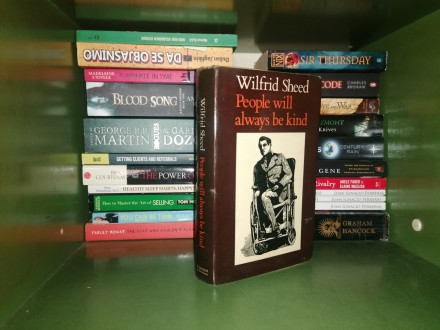People Will Always Be Kind, Wilfrid Sheed
| Cena: |
| Stanje: | Polovan sa vidljivim znacima korišćenja |
| Garancija: | Ne |
| Isporuka: | Pošta Post Express Lično preuzimanje |
| Plaćanje: | Tekući račun (pre slanja) PostNet (pre slanja) Pouzećem Lično |
| Grad: |
Smederevska Palanka, Smederevska Palanka |
Godina izdanja: Ostalo
ISBN: Ostalo
Jezik: Engleski
Autor: Strani
kao na slikama, otpis biblioteke, dobra unutra
Does it matter?–losing your legs? …
For people will always be kind,
And you need not show that you mind
When the others come in after hunting
To gobble their muffins and eggs.
–Siegfried Sassoon
Wilfrid Sheed’s 1973 novel, People Will Always Be Kind, takes its title from Sassoon’s poem about a paraplegic young war veteran, but Sheed’s protagonist, Brian Casey, is a victim not of combat but of polio. Well over half of the novel (the section titled, “Backgrounder”) recounts how Casey is suddenly struck by polio in high school and how he comes to turn his handicap into an effective tool for manipulating others–because, as Sassoon observes, “people will always be kind.”
In some ways, People Will Always Be Kind is a remarkably perceptive study of politics and human behavior. As his parents desperately attempt every cure, legitimate and outright criminal (leeches, at one point), Casey grows deeply cynical. “I don’t think I owe God any favors, after what he did to me,” he thinks to himself, and one of his Columbia classmates calls him “a man of little faith and much energy, the most dangerous of your human species.”
Casey cuts his teeth on campus politics and finds a natural talent for public speaking and private wheeling and dealing. But he also quickly realizes that campus politics was “like playing poker without money.” When next we see him, in the section titled, “The Perkins Papers,” he is a U. S. Senator, seen through the eyes of Sam Perkins, an idealistic Ivy League grad, part of a small movement trying to court a candidate to run for President on a peace platform. Sheed never mentions Vietnam in the book, referring to the war only as “The Issue.”
Casey takes up the challenge–or at least, he seems to. Although Perkins is not the sharpest knife in the drawer, even he understands that he’s dealing with a level of intelligence and sophistication far beyond his:
He also told me, though he didn’t have to by then, that he liked to hire high-minded people because they would do dirtier work for nothing than low-minded people would for hire. True. If the candidate so much as intimated to me that a principle was involved, it was like unleashing a rattlesnake. A low-minded person would at least have watched his own skin and thought about tomorrow.
During the campaign, a party hack comments, somewhat sarcastically, “That’s some staff you got.” “That’s not a staff–that’s my violin,” Casey responds.
Much like Eugene McCarthy, Casey achieves an unexpected breakthrough victory in New Hampshire and rolls into the convention as the leading candidate. Perkins does note that the transformation had less to do with the candidate that some undefinable combination of media coverage and popular sentiment: “Casey hadn’t changed a hair, but he suddenly had charisma and seemed like a great man.” He drives himself relentlessly, always conscious that any sign of exhaustion would be linked back to his polio: “Other politicians could show fatigue, Casey never. He would have to kill himself to prove his strength.”
Perkins quits the campaign in a childish and pretty unbelievable miff involving sexual jealousy over another staffer, but Casey wins the nomination and comes close to winning the election (a conditional cease-fire before the debate kills much of his momentum). Some observers, however, believe Casey made a deliberate choice to lose. His wife thinks it a matter of his struggle with his faith (Casey is an Irish Catholic): “It’s like an occasion of sin, if you know what I mean. He knows he shouldn’t be in politics.”
Yet brilliant as many of Sheed’s observations about politics are, People Will Always Be Kind fails as a coherent work of art. The two parts of the novel are unbalanced: “Backgrounder” burrows deep into Casey’s evolving psyche, while “The Perkins Papers” shows him through a glass, dork-ly. The campaign has the potential to be a much richer source of material–Time magazine’s reviewer thought that, “Sheed’s only real mistake was to quit writing about 200 pages short of his natural stopping place.” Certainly the book loses much of its strength by substituting Sheed’s profoundly intelligent omniscient voice in “Backgrounder” for Sam Perkins’ fuzzy-headed first-person voice in the second half. And while Brian Casey may be a terrific vehicle for navigating the winding ways of American politics, as a character he becomes something of a Cheshire Cat. In the last dozen pages of the book, he almost entirely fades away, leaving us with only his ironic smile.
Predmet: 69269341











